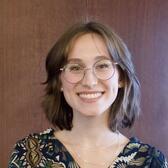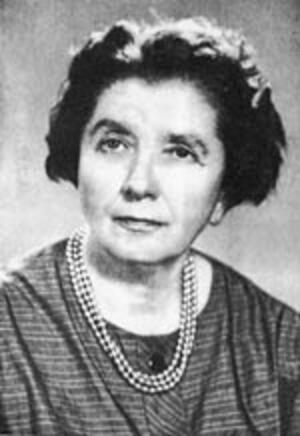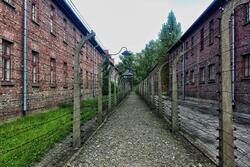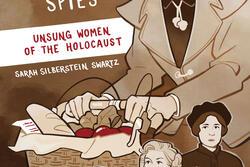Rokhl Auerbakh Made Me Rethink Holocaust Remembrance
"Giving voice to the victims": Rokhl Auerbakh (1903–1976), a member of the Polish-Jewish literary elite, ran a soup kitchen in the Warsaw Ghetto while simultaneously in her writing recording the voices of its captive inhabitants. She ultimately survived the war by passing herself off as an "Aryan," and went on to found the Department for the Collection of Witness Testimony at Yad Vashem in Jerusalem.
Institution: By the Last Way, by Rokhl Auerbach (Tel Aviv: 1977)
Yiddish writer Rokhl Auerbakh wrote the essay "Yizkor, 1943" as she watched Nazi occupiers violently force the Jews of Warsaw into a ghetto and eventually, deport them to the Treblinka killing center. At the time she wrote the essay, Auerbakh had lived for over two years in the confines of the Warsaw Ghetto. She dedicated these years to working for the underground Oyneg Shabes archive, as part of a covert network of researchers diligently documenting the deprivation and violence occurring within the ghetto walls. On March 9, 1943, Auerbakh escaped the ghetto by passing as "Aryan." She continued writing in secret, living among Poles in the Aryan part of Warsaw until Soviet troops liberated the city in 1945. From this moment on, Auerbakh cultivated a lifelong commitment to chronicling and memorializing the Holocaust, or khurbn in Yiddish.
To commemorate International Holocaust Remembrance Day on January 27, I have been reading Auerbakh’s work in the original Yiddish. Her writings are a testament to the work of Jewish cultural preservation, but hardly any of them are translated into English. Reading her in Yiddish forced me to renegotiate my perspective on Holocaust remembrance. Many Yiddish words don't translate clearly into English, from culturally-specific words like yizker (the Jewish memorial prayer), to everyday words like shvaygn (be silent). This makes the process of translation inherently reflective—how do her language and memories map onto my own? Although our contexts differ, we both believe that humility, sensitivity, and resilience make the act of remembering powerful.
"Yizkor, 1943” explores the potency of memory. Having witnessed the destruction of everything familiar to her, Auerbakh expresses contradicting desires: to remember the source of her pain and to overcome it. In the essay, she records the names of her murdered family members and describes them as they once lived. After reciting the list of the dead, she writes,
"And when I come to the end of the list…I start over again from the beginning, and always in pain. Each of them hurts me individually, the way one feels pain when parts of the body have been surgically removed. When the nerves surviving in the nervous system signal the presence of every finger on amputated hands or feet."
A part of her wants nothing more than to bandage her wounds. Phantom limbs have replaced the presence of her loved ones. Her pain is nearly so raw as to keep her from fulfilling her communal responsibility to memorialize.
"I may neither groan nor weep. I may not draw attention to myself in the street. And I need to groan; I need to weep. Not four times a year. I feel the need to say Yizkor four times a day."
As Auerbakh describes, there are clear instructions for remembrance in Jewish ritual. We gather to learn from the biblical past on Passover, honor the anniversary of loved ones' deaths on their yortsayt, and mourn the destruction of the First and Second Temples on Tisha B'Av. But in Auerbakh's moment of suffering, she considers the painful ritual of reciting Yizkor, the prayer to remember the dead, as too potent—too heavy a burden—to continue practicing. She asks herself, "What madness is it that drives one to list the various kinds of Jews who were destroyed?" Although she scornfully questions one of the very foundations that Jewish life is built upon, she recites the prayer nonetheless.
The physical outcry of grief, through naming, is inseparable from remembrance. She relies on her community, who say Yizkor with her, to face the burden of their collective grief. She declares, "Let [he who has survived] hear those words and remember his names as I have remembered mine—the names of those who were destroyed." By speaking their names, she makes their memories concrete.
In the months leading up to this International Holocaust Remembrance Day, I have meditated on two lines from the essay almost daily:
"Those whom I knew and loved press on my memory, which I compare now to a cemetery. The only cemetery in which there are still indications that they once lived in this world."
For me and millions of others, the acts of witnessing, grieving, and remembering have become regular practices. Auerbakh shows that pain is an inevitable part of this process. We recite the names of the dead—no matter the toll it takes on us personally—so that they will live on.
In a later essay from 1958 titled "Lomir shvaygn" (Let Us Be Silent), Auerbakh's remembrance practices have transformed. Fifteen years after the Warsaw Ghetto Uprising, now living in the State of Israel, she published this piece in Di goldene keyt (The Golden Chain), the leading Yiddish-language literary journal of the postwar era. In it, she reports on the condition of Holocaust memorialization, reimagining the act of being silent as a valiant form of commemoration.
Rather than fighting her inner voice as she did in 1943 ("Enough, enough … I have to stop writing / No. No. I can’t stop"), she now instructs her audience with clarity:
"Let us be silent—Let us consecrate this day anew. Let us light candles, let us be silent six minutes and a minute. For those who perished, and for those who rose like the whole flame between the harsh plumes of smoke."
Here, silence acts as the precursor for a solemn, respectful, reverent practice of remembrance. She offers this ritual as an alternative to Holocaust remembrance ceremonies that haven’t resonated with her.
"This year, like every year, crowds will set out in droves with buses and with trains to memorial services. Orchestras will play tragedy-marches, kibbutz choirs will sing ghetto songs and partisan hymns. Cantors will raise our tremendous cry under the open sky—and we will respond with stifled sobs, we the orphaned, who will sit there."
The mourners Auerbakh writes about are forced to bury their grief every day to continue living. But for one day each year, they must find the strength to resurrect it. To support mourners with this painful act, curated ceremonies bring them together to express their grief. Although we may see such institutionalization as a natural progression of communal memory, Auerbakh sees this as an insufficient practice.
If mourners were to move away from externalizing their grief, what might Holocaust remembrance look like? At first—when the existential urgency of genocide threatened Auerbakh's life—self-reflection only existed in tortured fragments. Now—expecting that "[the commemoration] speeches will be gratuitous, pitiful compared to every deed [of the martyrs]"—these rituals become inappropriate, even self-indulgent. Instead, she demands a practice of humility and reflection.
"Let us interrupt the speeches of the speakers and the singing of the choirs and the tragedy-marches of the orchestras. ... It should be so quiet as to hear the flicker, the drip-drops of the yortsayt [memorial] candles. To hear in the air the sounds of revolvers against cannon-booms."
For Auerbakh, being silent is a sacred act that allows her to traverse landscapes of memory, to put herself between the present and the past and allow their sounds to guide her into remembrance and lamentation. When she chooses to be silent, she also chooses to be vulnerable—reopening wounds in order to bear witness to the horrors of the recent past.
The Yiddish word shvaygn, translated throughout this piece as "being silent," does not have an exact English translation. In Yiddish, it is an action verb. A literal translation of lomir shvaygn would be "let us silent." Auerbakh commands her readers to “silent”—the same way that they would speak, hear, or remember.
"Let us silent, let us hold ourselves to account, let us listen closely to the beats of our own hearts, so that we should be worthy."
In Yiddish, silence is an action and an honorable path for Holocaust commemoration.
So let us be silent, if only for this one remembrance day. What we hear may move us to listen to unfamiliar voices, to hold space in our hearts for them, to bear witness to their oppression, and to remember their suffering—reciting new names and honoring new memories—alongside our own.
This article uses an open access English translation of "Yizkor, 1943" by Leonard Wolf, published on Tablet. The translation of "Let Us Be Silent" is the author's own, with great thanks to Claire Breger-Belsky, Grisha Leyfer, and Caleb Sher.







